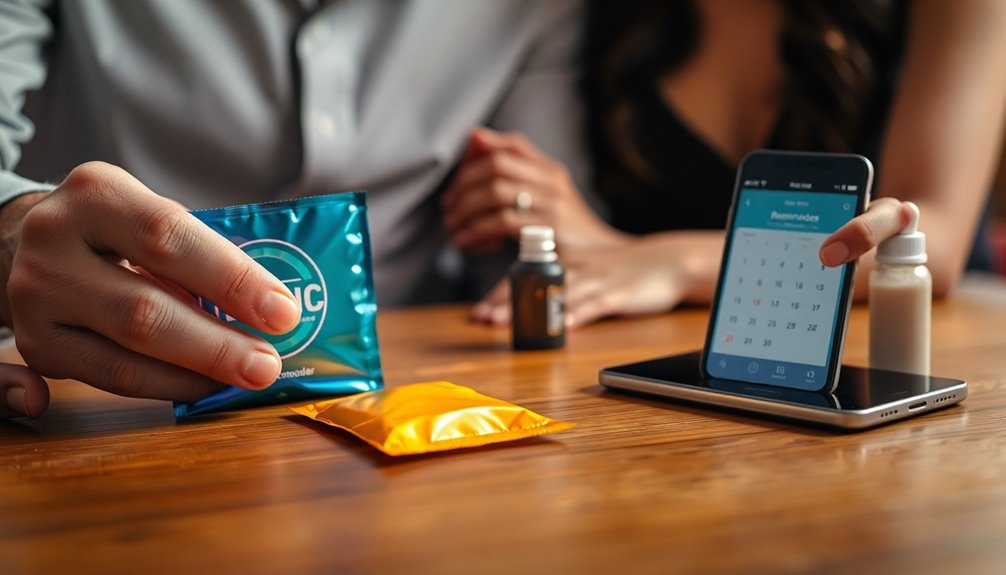Bleeding during sex can happen for several reasons, and it's more common than you think. You might be experiencing cervical ectropion, which makes cervical cells more prone to bleeding, or you could have a sexually transmitted infection causing inflammation. Vaginal dryness is another frequent culprit, especially during menopause. In some cases, benign growths like polyps or more serious conditions might play a role. If you've noticed persistent bleeding, it's essential to seek medical advice to rule out any serious issues. Understanding these causes can help you find the support and answers you need.
Key Takeaways
- Bleeding during sex can be caused by cervical ectropion, where fragile cervical cells bleed due to hormonal changes or pregnancy.
- Infections like STIs can lead to cervicitis, causing inflammation and bleeding during intercourse.
- Vaginal dryness, often due to menopause or insufficient arousal, can result in friction-related tears and subsequent bleeding.
- Benign growths, such as cervical or uterine polyps, may cause postcoital bleeding, especially in women aged 40-50.
- Persistent or heavy bleeding can indicate serious conditions, including cervical or uterine cancer, warranting prompt medical attention.
Common Causes of Bleeding

Bleeding during sex can be alarming, but understanding the common causes can help ease your concerns.
One potential reason for postcoital bleeding is cervical ectropion, where fragile cervical cells may bleed, especially if you're using hormonal birth control or are pregnant.
Sexually transmitted infections (STIs) like chlamydia and gonorrhea can cause cervicitis, leading to inflammation and bleeding.
Vaginal dryness, often experienced during menopause or due to insufficient arousal, can result in friction-related tears.
Additionally, benign cervical or uterine polyps can cause postcoital bleeding, particularly in those aged 40-50 who've had multiple pregnancies.
Finally, atrophic vaginitis due to decreased estrogen can thin vaginal walls, leading to bleeding during sex.
Understanding these causes can help you address your concerns effectively.
Medical Conditions to Consider

When it comes to postcoital bleeding, several medical conditions could be at play. Understanding these can help you identify potential issues. Here are some conditions to take into account:
| Condition | Description | Symptoms |
|---|---|---|
| Cervicitis | Inflammation of the cervix, often due to STIs | Bleeding, discharge, pain |
| Cervical Polyps | Benign growths on the cervix, common in older women | Bleeding during sex |
| Atrophic Vaginitis | Thinning of vaginal walls post-menopause | Vaginal dryness, bleeding |
| Cervical Ectropion | Fragile blood vessels on the cervix | Easy bleeding, irritation |
These conditions can cause discomfort and should be evaluated if you experience persistent bleeding.
Importance of Seeking Help

Experiencing postcoital bleeding can be alarming, but seeking medical help is essential for understanding the underlying causes. Consulting with healthcare providers allows you to receive accurate diagnoses and appropriate treatment for conditions ranging from benign issues like cervical polyps to serious concerns such as cancer.
Open communication about your symptoms can alleviate emotional stress and create a supportive environment. Monitoring and reporting your bleeding patterns helps healthcare professionals determine the necessary interventions, leading to effective management strategies.
If the bleeding is heavy, persistent, or accompanied by pain or unusual discharge, prompt medical attention is vital. Don't hesitate to seek medical advice; your health is important, and early intervention can prevent complications down the line.
Potential Complications

When you experience bleeding during sex, it can signal chronic conditions that need attention, from infections to more serious issues like cancer.
This ongoing concern can also take a toll on your emotional well-being, creating anxiety that affects your intimate relationships.
Addressing these potential complications early can help safeguard both your physical and mental health.
Chronic Conditions Overview
Chronic conditions can greatly impact your sexual health, often leading to complications like recurrent bleeding during intercourse.
Conditions such as endometriosis or pelvic inflammatory disease (PID) can cause painful, postcoital bleeding. If you notice persistent bleeding during sex, it may signal serious concerns like cervical or uterine cancer, making immediate evaluation by a healthcare provider essential for early detection.
Chronic cervicitis, usually stemming from untreated sexually transmitted infections, can also lead to continuous inflammation and bleeding. Additionally, benign cervical polyps or fibroids might contribute to ongoing issues.
For those experiencing chronic vaginal dryness, particularly postmenopausal individuals, it's important to discuss management strategies with your healthcare provider to improve your sexual health and reduce discomfort. Furthermore, understanding estate planning is vital as it can provide peace of mind regarding future healthcare decisions and financial responsibilities.
Emotional Impact Considerations
Bleeding during sex not only signals potential health issues but also carries significant emotional weight. You might experience emotional distress, which can lead to anxiety and fear surrounding intimacy. This can ultimately diminish your sexual health and desire.
Here are three key considerations:
- Communication Strain: Feeling embarrassed or ashamed may hinder open discussions with your partner, affecting intimacy.
- Avoidance Behavior: You may start avoiding sexual encounters, which can lead to decreased relationship satisfaction.
- Health Concerns: Worrying about the underlying cause can increase stress, impacting your overall well-being.
Addressing these feelings and seeking medical advice can help create a supportive environment, ensuring that you and your partner can navigate these challenges together.
Risk Factors Involved

When it comes to bleeding during sex, several risk factors can play a role.
Hormonal changes, especially from birth control, can cause unexpected spotting.
Additionally, sexual health conditions like cervicitis or STIs can heighten the likelihood of experiencing this issue.
Hormonal Changes
Hormonal changes throughout your menstrual cycle can greatly affect your vaginal health, making tissues more sensitive and fragile. This sensitivity can lead to bleeding during sex. Several factors contribute to this:
- Hormonal contraceptives can cause irregular bleeding patterns, including unexpected spotting during or after intercourse.
- Menopause brings decreased estrogen levels, resulting in vaginal atrophy and dryness, increasing the risk of bleeding.
- Pregnancy raises blood flow to the cervix, which may cause it to be more prone to bleeding during sexual activity.
Being aware of these hormonal changes can help you understand why you might experience bleeding during sex. Additionally, maintaining adequate hydration can support overall vaginal health and potentially reduce sensitivity.
If it persists, consider consulting a healthcare professional for guidance.
Sexual Health Conditions
Understanding the various sexual health conditions that can lead to bleeding during sex is essential for maintaining your well-being.
Postcoital bleeding can often stem from sexually transmitted infections (STIs) like chlamydia or gonorrhea, which cause cervical inflammation.
Cervical ectropion, where delicate cervical cells are exposed, may result in bleeding due to their fragility.
If you're experiencing vaginal dryness and thinning tissues, atrophic vaginitis—common after menopause—can heighten the risk of bleeding during intercourse.
Additionally, cervical polyps or endometriosis can also contribute to unexpected bleeding.
Being aware of these conditions helps you address any concerns with your healthcare provider promptly, ensuring you maintain peak sexual health and comfort.
When to Consult a Provider

Are you experiencing bleeding during or after sex that seems unusual? It's important to consult a healthcare provider if you notice any of the following:
- Frequent postcoital bleeding not linked to your menstrual cycle.
- Heavy bleeding that soaks through multiple pads or tampons, which could indicate serious issues.
- Pain during intercourse alongside bleeding, as this warrants an evaluation to determine the cause.
If bleeding happens after menopause, or if you experience unusual discharge or changes in your menstrual patterns, don't hesitate to seek help.
A provider can know what's going on and guide you toward appropriate care. Remember, your health is paramount, so take these signs seriously.
Preventive Measures

Experiencing bleeding during sex can be concerning, but there are steps you can take to minimize the risk.
One effective preventive measure is using water-based lubricants to combat vaginal dryness, a common cause of bleeding. Engaging in sufficient foreplay can also enhance arousal and promote natural lubrication, reducing friction-related injuries.
Regular gynecological check-ups are essential for early detection and treatment of conditions like cervical polyps or infections that may lead to postcoital bleeding.
Additionally, avoid harsh soaps or douching products to maintain your vagina's natural balance and prevent irritation.
Finally, practicing safe sex and getting tested for sexually transmitted infections (STIs) can further reduce the risk of infections that might contribute to bleeding during or after sex.
Additional Resources and Support

When dealing with concerns about bleeding during sex, accessing the right resources can make a significant difference in your comfort and understanding.
Here are three valuable options to evaluate:
- Educational Materials: Websites like Planned Parenthood and the Mayo Clinic offer thorough information on causes and when to seek help, along with brochures available at healthcare facilities.
- Health Hotlines: Many healthcare providers have hotlines where you can ask questions and receive guidance on sexual health issues without needing an appointment.
- Support Groups: Online forums and local support groups can provide community support, allowing you to share experiences and connect with others facing similar concerns.
Utilizing these resources can empower you to better understand and address your situation.
Frequently Asked Questions
Is Bleeding During Sex Normal?
Is bleeding during sex normal? It can happen and isn't always a cause for concern.
Many factors, like vaginal dryness or hormonal changes, can lead to minor bleeding. You might also notice spotting related to your menstrual cycle. If it's infrequent and light, it's often nothing serious.
However, if you experience persistent or heavy bleeding, it's best to consult a healthcare provider to rule out any underlying issues.
Can You Bleed if Your Partner Goes Too Deep?
You might be surprised to learn that deep penetration can indeed cause bleeding.
If your partner goes too deep, it can create friction and trauma to the vaginal walls, especially if you're dry or sensitive. You could experience microtears, leading to light bleeding or spotting.
Conditions like cervical ectropion or endometriosis could heighten this risk. If it happens often or hurts, it's essential to seek advice from a healthcare provider.
What Is It Called When You Bleeding During Sex?
When you're bleeding during sex, it's known as "postcoital bleeding."
This can happen for various reasons, such as cervical issues, infections, or other medical conditions. You should pay attention to the amount of bleeding—light spotting mightn't be serious, but heavier bleeding could indicate a problem.
If you experience this regularly, it's crucial to consult a healthcare provider for a proper diagnosis and treatment.
Don't ignore it; your health matters!
Should I Go to the Hospital if I Bleed During Sex?
If you're bleeding during sex, it's wise to contemplate seeking medical help.
If the bleeding is heavy or accompanied by pain, you shouldn't wait to get checked out. It could indicate a serious issue that needs attention.
Trust your instincts—if something feels off or unusual, a healthcare professional can provide clarity and reassurance.
Prioritize your health; it's always better to be safe than sorry when it comes to your body.
Conclusion
If you're experiencing bleeding during sex, it's essential to understand the underlying causes and not brush it off as normal. Picture the relief of addressing this concern—imagine having open conversations with a healthcare provider who can guide you through potential solutions. Seeking help can not only alleviate your worries but also enhance your sexual health. Don't hesitate to reach out; your well-being deserves attention, and you're not alone in this journey.










